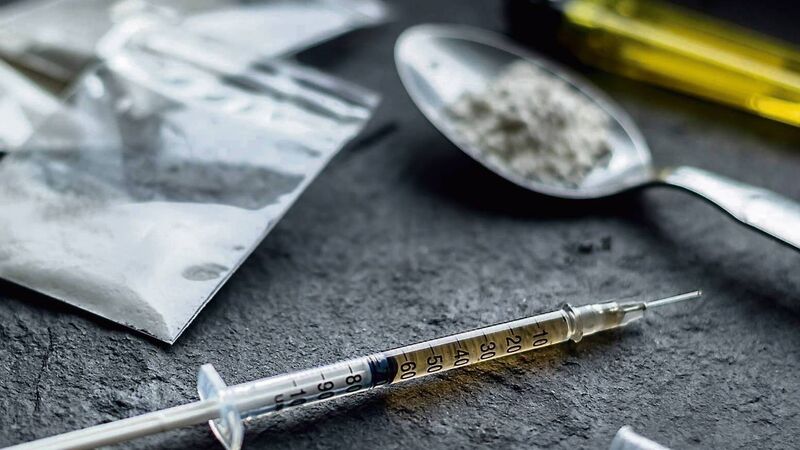Rapid response to synthetic drug crisis saved lives in Cork

Drug use has changed so dramatically over the past 10 years with all the new types of manufactured substances like the counterfeit heroin.
Almost a year on from a spate of overdoses due to synthetic opioids in Cork, HSE and Cork Simon staff look back on how speedy intervention saved lives.
The HSE head of drugs and alcohol services in Cork and Kerry, David Lane, told The Echo, “in November of 2023, we were looking at a significant number of overdoses in Dublin with what was determined afterwards to be a synthetic opioid, which was very dangerous in terms of people going into overdose very quickly.
“What we did in Cork was got a multidisciplinary group together — this included a number of HSE departments including community healthcare, needle exchange, and social inclusion, as well as the Mercy Hospital, which would be the main hospital people in an overdose situation go to.”
Early warning
The Early Warning Emergent Trends group also comprised of An Garda Siochána, Cork Local Drug and Alcohol Taskforce, Coolmine Therapeutic Community, the National Ambulance Service, as well as Cork Simon, De Paul, and Good Shepherd.
Mr Lane explained: “The emergency department laboratories and nursing were represented, so there was a broad spectrum of disciplines as well as key agencies in the city who support very vulnerable people who are homeless and use drugs.
“We got that group together in November of last year, and started meeting regularly around what had been happening in Dublin and preparing ourselves for emergence of this new drug in our city.”
The group set up a number of systems to get the word out to people using opioids as quickly as they could, he said.
“One of the best ways was we got contact phone numbers from people who were willing to get messages into their phones so we had live information going out.
“It was an opt-in service, people had to share their phone numbers for it, but likewise for people who didn’t have phones, we put word on the street out with outreach workers, got posters into areas we knew heroin use was happening — we used all systems at our disposal,” he said. “Then one day in December a number of overdoses happened in Cork in a 24-hour period, so it was about trying to get a sample of the drug that was in circulation and get it tested fast.
“We got results back in 24 hours confirming nitazenes were circulating in Cork, and we used a red warning to people across the city that there was something very dangerous out there. They became very aware, very quickly, they were seeing it for themselves.”
Framework
The group was maintained as they found it a useful framework in terms of identifying trends that were emerging and could emerge over the coming years, and the agencies continue to meet to share information in terms of what they’re seeing on the ground.
A big part of their response was naloxone, a drug which can quickly reverse an opioid overdose.
Mr Lane said: “In terms of responding to this issue and preventing deaths, naloxone was so important — for a good few years we’ve been educating people such as those on the HSE methadone programme about how to use this lifesaving drug.
“When people know how to use it, if they see friends getting into difficulty or having an overdose, it can be administered onsite, reversing the effects, so it can save lives — it has saved many lives.”
Frontline health and social care workers were trained in administering the drug, and an education programme runs in Cork prison for anyone who was known to be using opioids.
On release from prison, they are given naloxone, with Mr Lane explaining, “people who use drugs, their tolerance goes way down while they’re in prison, so if they use again on release, they can get into overdose very quickly.
“Education in prisons is key for this reason, we have key workers going in prior to people’s release so that they understand the risk of overdose in terms of losing tolerance and sharing the information on naloxone administration.”
Cork Simon director Dr Dermot Kavanagh said “there were 50 overdoses in Dublin in November last year identified as involving nitazenes which were being sold as heroin.
“Nitazenes are particularly dangerous, they’re a synthetic opioid that is much, much stronger than heroin so there’s a much higher risk of overdose happening and a higher risk of it leading to hospitalisation or to death.
“The HSE got the early warning and emergent trends group set up straight away, we all realised this could be coming to Cork pretty soon, and that group included ourselves and other services who deal with drug users face to face.”
Willingness to learn
Dr Kelleher said “there was a real willingness to learn”, from the drug users they speak with, adding “every agency was speaking with one voice — if you take this stuff, you could die, so of course people listened to that.
“The information they were getting was really proactive, there were really useful leaflets made by the HSE that people using drugs could pass on.”
There were 17 drug overdoses linked to nitazenes in Cork in 10 days last November, and Dr Kelleher said “since then the group has kept going, there’s been different alerts we’ve attended to regarding different drugs.
“The HSE provided a lot of training for our frontline staff, advanced first aid, naloxone administration, and the connections we have with people came in very helpful to warn them of the risks and we had a two way information streak going, getting information we would then provide back to the HSE.
“The HSE were like lightning — coordinating the whole thing — the group was up and running even before the drug arrived in Cork, it was so quick, so well-coordinated, and everybody was working together getting the info out.”
Dr Kelleher concluded: “Drug use has changed so dramatically over the past 10 years with all the new types of manufactured substances like the counterfeit heroin.
“Our group remains a standing group because a new thing could pop up tomorrow —we’re glad to have that forum to be alert to any future changes.
“Two things save lives — naloxone and good, reliable, trustworthy information.”







 App?
App?


